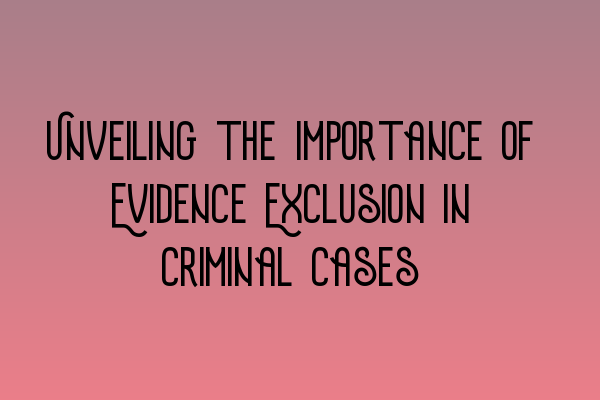Unveiling the Importance of Evidence Exclusion in Criminal Cases
In criminal law cases, evidence plays a pivotal role in establishing guilt or innocence. It provides the foundation upon which the judge and jury make their decisions. However, not all evidence should be admissible in court. The exclusion of certain evidence is a critical aspect of the criminal justice system that ensures fairness and protects individuals’ constitutional rights.
Understanding the concept of evidence exclusion is essential for both legal professionals and defendants facing criminal charges. This article will shed light on why evidence exclusion matters, how it is determined, and the impact it can have on the outcome of a criminal case.
What is Evidence Exclusion?
Evidence exclusion refers to the process of excluding or suppressing certain evidence from being presented at trial. This occurs when the evidence was obtained illegally, in violation of the defendant’s constitutional rights, or when it is inherently unreliable or prejudicial.
The exclusion of evidence is grounded in the principle that everyone is entitled to a fair trial. This means that evidence obtained in a manner that violates the accused’s Fourth Amendment rights against unreasonable searches and seizures or Fifth Amendment rights against self-incrimination may be deemed inadmissible.
Why Does Evidence Exclusion Matter?
The exclusion of evidence serves several crucial purposes in criminal cases:
1. Protecting Constitutional Rights: Evidence exclusion ensures that law enforcement officials uphold individuals’ constitutional rights while gathering evidence. It acts as a check on law enforcement misconduct, preventing the use of evidence obtained through coerced confessions, illegal searches, or other constitutional violations.
2. Preventing Prejudicial Influence: Evidence that is unduly prejudicial, confusing, or misleading may be excluded to maintain a fair trial. This prevents the jury from being swayed by evidence that could unfairly impact the defendant’s character or lead to an erroneous verdict.
3. Preserving Judicial Integrity: Excluding evidence obtained unlawfully upholds the integrity of the judiciary. It sends a message that violations of individuals’ rights will not be tolerated and ensures that our justice system operates in a just and unbiased manner.
How is Evidence Exclusion Determined?
The determination of evidence exclusion involves a careful analysis of the circumstances surrounding the evidence’s collection and its potential impact on the case. The judge presiding over the trial plays a crucial role in making this determination.
Several legal doctrines guide judges in deciding whether to admit or exclude evidence:
1. Exclusionary Rule: This rule prohibits the use of evidence obtained through illegal searches and seizures. If the evidence is acquired in violation of a defendant’s Fourth Amendment rights, it is subject to exclusion.
2. Fruit of the Poisonous Tree Doctrine: Evidence derived or obtained as a direct result of an unlawful action may also be excluded. This doctrine prevents the prosecution from benefiting from evidence that would not have been discovered if not for an initial constitutional violation.
3. Balancing Test: Judges assess the probative value of the evidence against its prejudicial effect. If the potential prejudice outweighs the probative value, the evidence may be excluded.
The Impact of Evidence Exclusion on Criminal Cases
The exclusion of evidence can significantly impact the outcome of a criminal case. When crucial evidence is excluded, the prosecution’s case may weaken, making it difficult to prove guilt beyond a reasonable doubt. Conversely, evidence exclusion can strengthen the defense’s position and potentially lead to dismissed charges or a more favorable outcome for the defendant.
As legal professionals, it is crucial to understand the nuances of evidence exclusion and advocate for its application when appropriate. Defendants must work closely with their legal representatives to ensure that any unlawfully obtained evidence is brought to the court’s attention to protect their rights and secure a fair trial.
Conclusion
Evidence exclusion is an integral part of criminal law cases, ensuring fairness and protecting individuals’ constitutional rights. By excluding evidence obtained unlawfully or that is prejudicial, we uphold the principles of justice and maintain integrity within our legal system. Understanding the importance of evidence exclusion allows both legal professionals and defendants to navigate the complexities of criminal cases more effectively.
